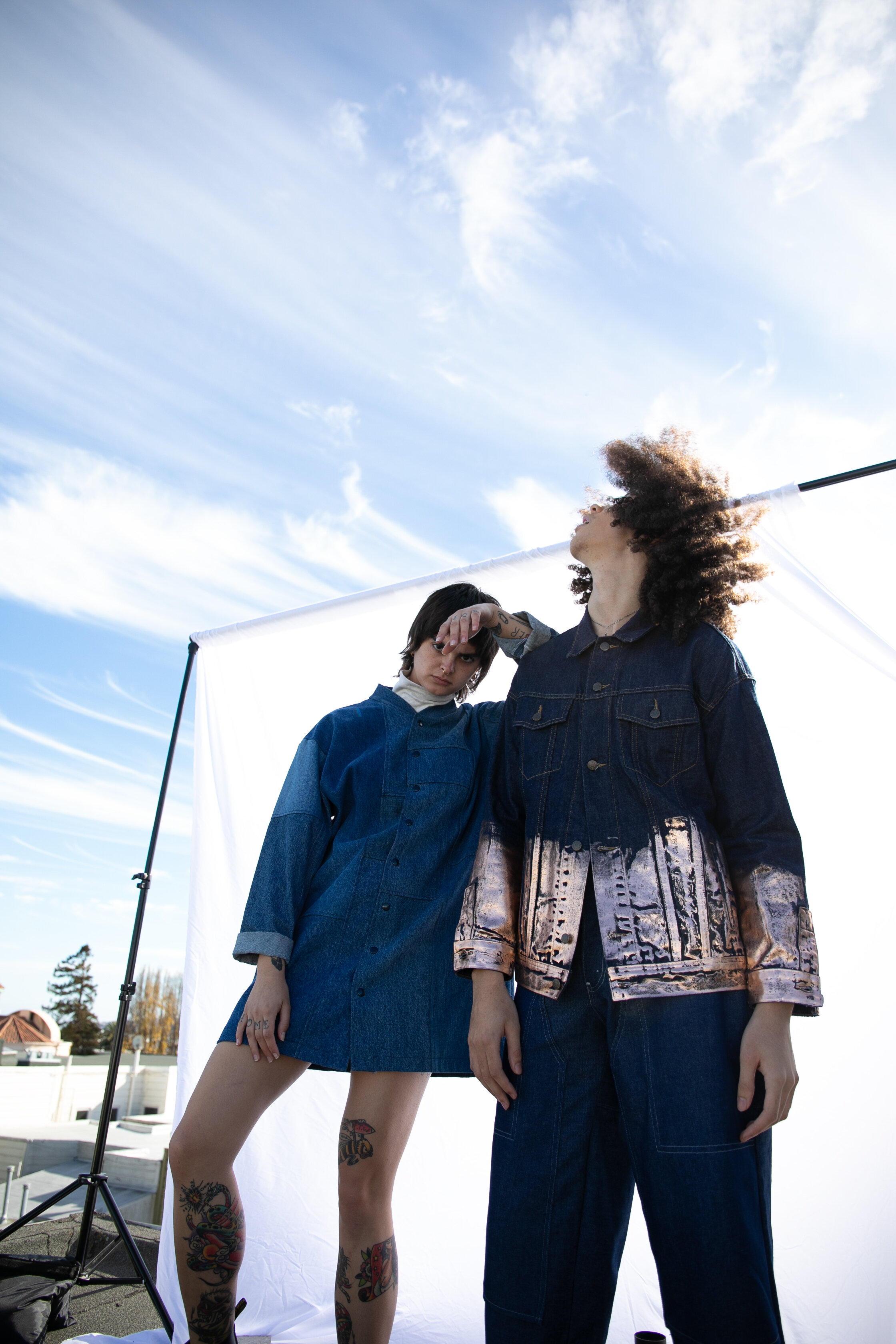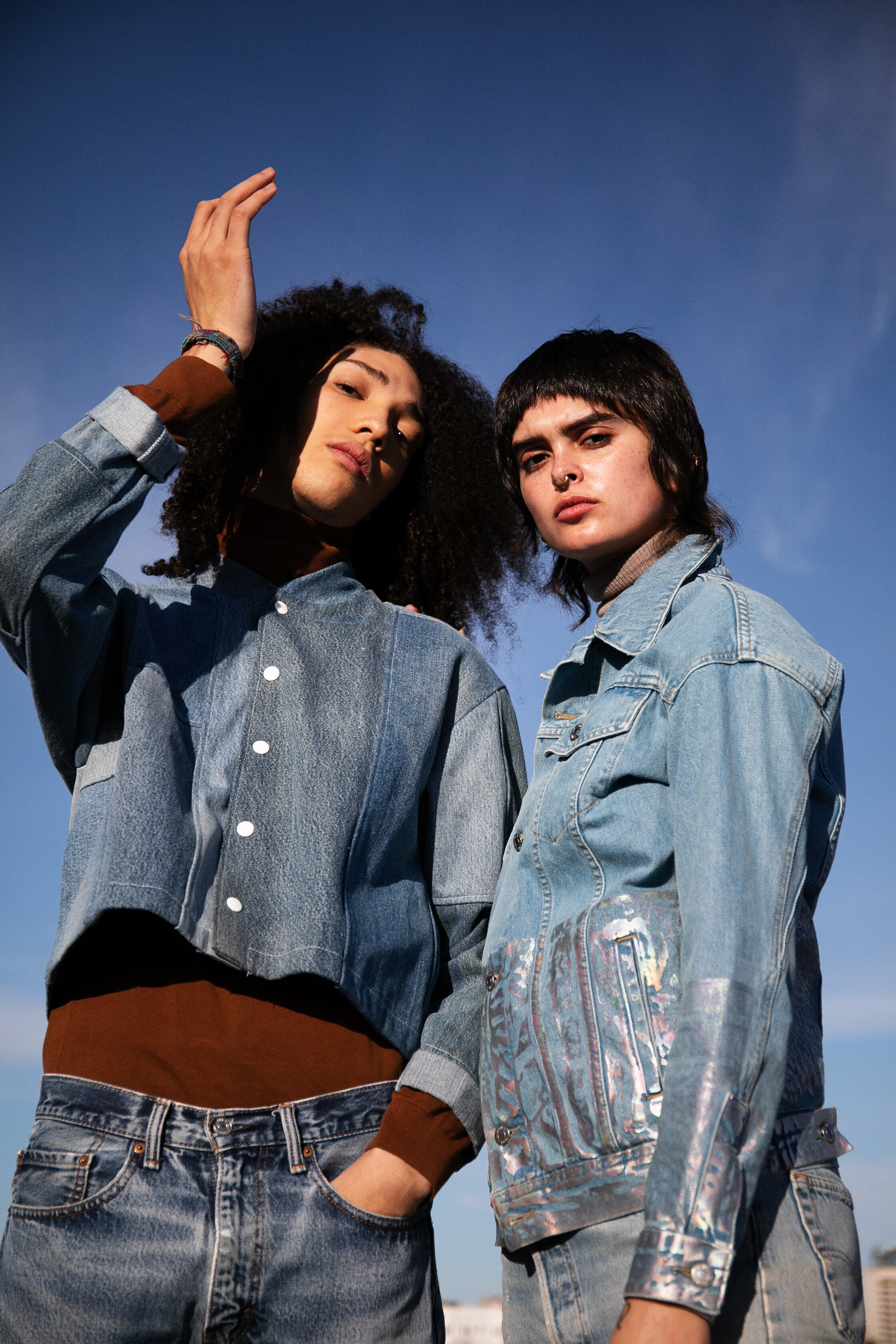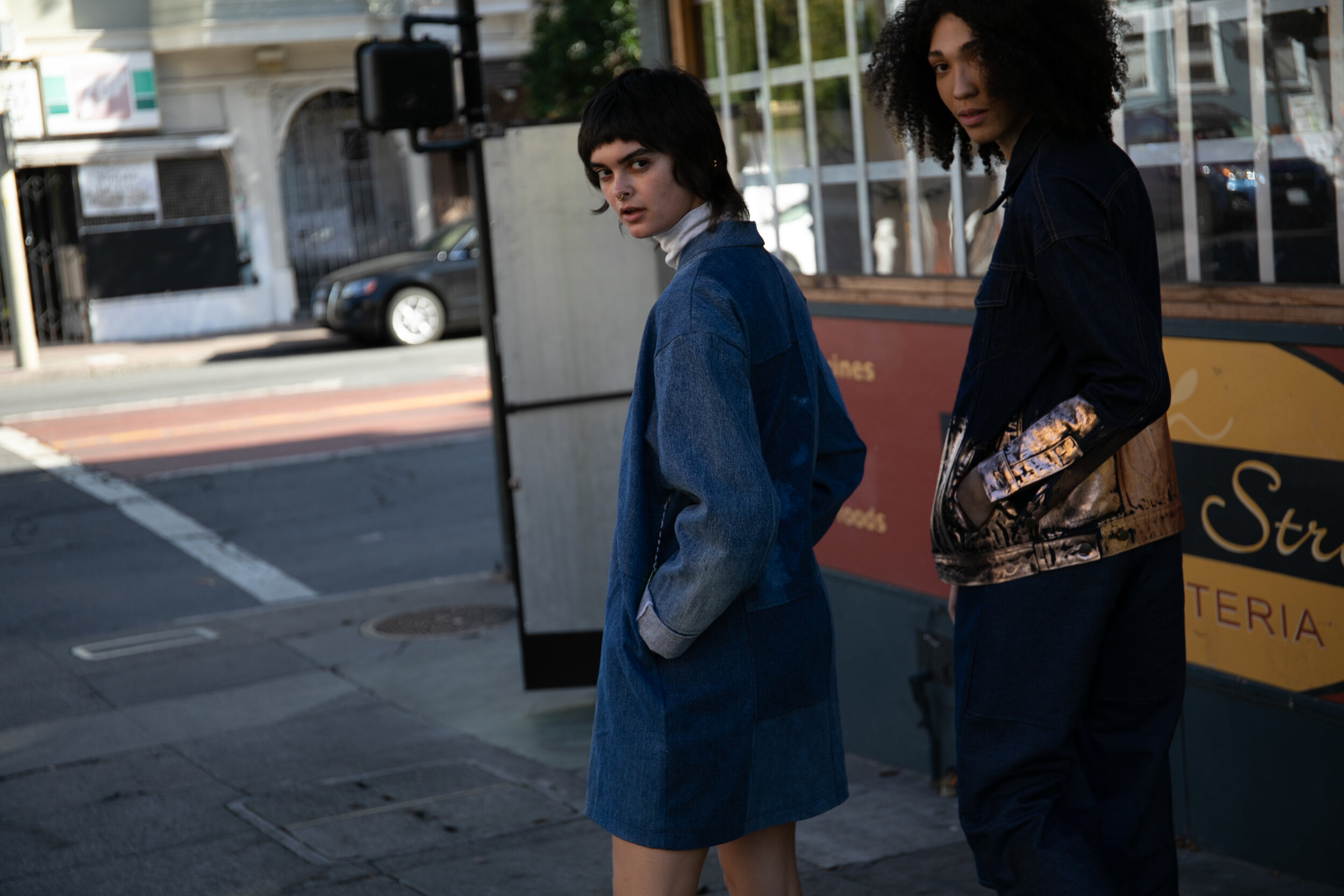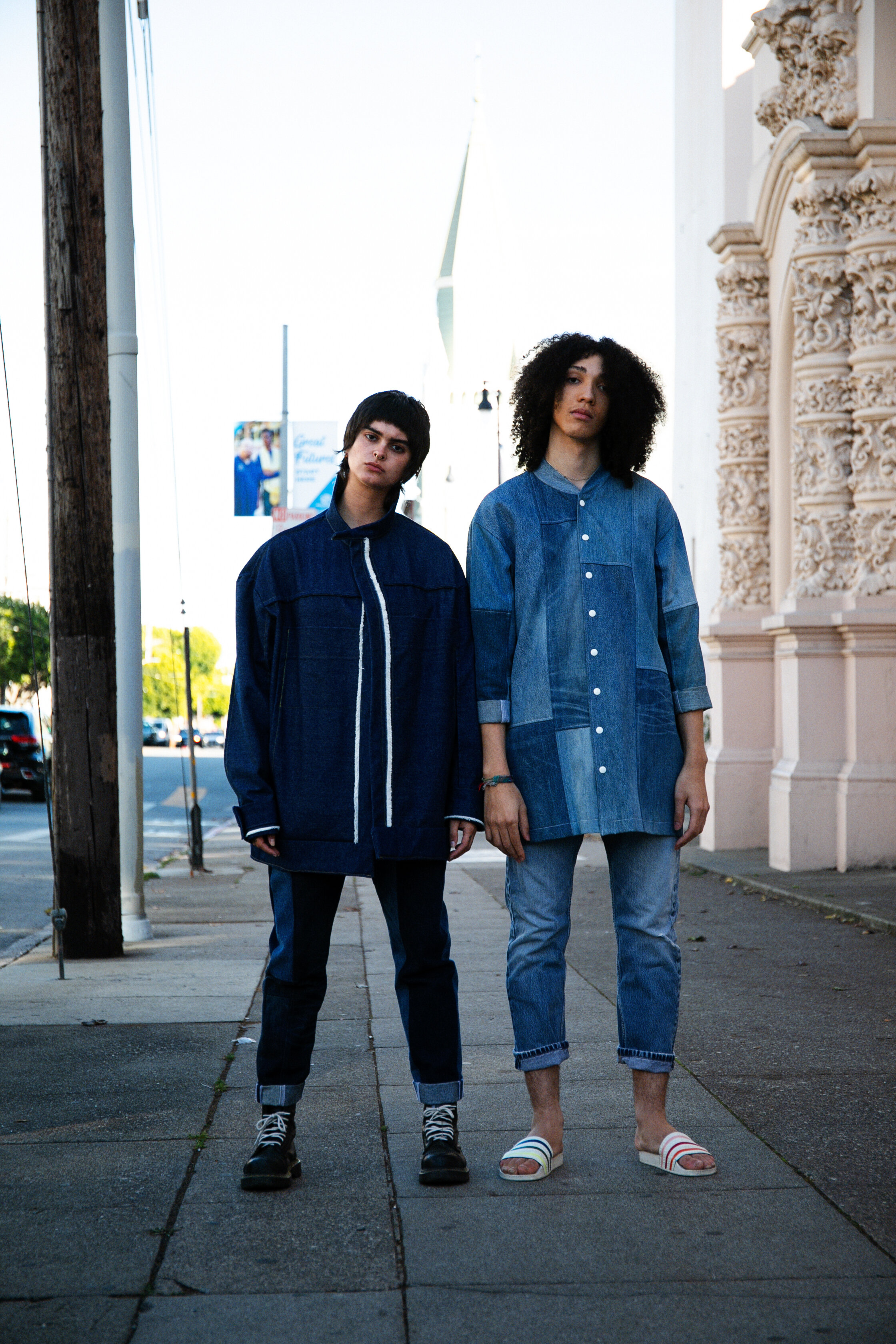Denim Is alive and Well in
San Francisco
Exhibit A, B and C: Venim, WRN FRSH and Saint Jubilee
Photographer & Creative Direction: Alon Reuveni, By: Gail Goldberg
We concede that sweatpants and all manner of comfy clothes are the official uniform of 2020. With equal gusto, we declare that denim is, in fact, not dead. Reports of its demise are wholly exaggerated—especially in San Francisco, birthplace of the blue jean and the headquarters of the company named for the man who created it 147 years ago. Looking at you, Levi Strauss & Co.
From the moment the Bavarian dry-goods merchant Levi Strauss and his tailor Jacob Davis added metal rivets to durable denim work pants during California's Gold Rush days, the City by the Bay was all in. Today, SF-ers are still enamored with Strauss' most iconic of American inventions and still wearing jeans…pandemic be damned. Denim is for everyone.
With this in mind, it should come as no surprise that the city's love of denim inspired our latest fashion shoot. The stars of the show: two rad models and a trio of up-and-coming SF brands, each reinventing the wonder fabric in a singular way. Say hello to Venim, WRN FRSH and Saint Jubilee.
Aryeh: WRN FRSH coat, Vintage Levis jeans via WRN FRSH. Madison: Saint Jubilee Jacket, WRN FRSH pants.
Aryeh: Venim Jacket, Saint Jubilee pants. Madison: WRN FRSH coat.
Madison: WRN FRSH coat.
Aryeh: Venim Jacket, Saint Jubilee pants.
VENIM
Founders: Leslie Fong, CEO, and Kaycee Houchin, head of product
Signature denim: Customizable foil jackets
After meeting in design school (The Art Institute of San Francisco) and 10 years of friendship, circumstances were finally ideal for Fong and Houchin to work together. In summer 2018, Fong was laid off from her job as director of brand marketing at buzzy eyewear brand Westward Leaning. Houchin, whose very first job was at Levi's, was ready to transition out of her role as a technical designer at Stitch Fix.
Fong had been itching to ditch the spreadsheets and get back into design for a while and was crystal-clear about her next move: "It was time to get back into the driver’s seat and to feel that sense of limitless imagination, again," she explains. Houchin's reaction upon learning of Fong's plans to get into the customizable denim-jacket biz with her help? "I’m pretty sure I just started screaming with excitement," recalls Houchin.
In fairly short order, the duo developed the product, launched a successful Kickstarter (meeting their funding goal of $60K) and, voila, Venim is officially official.
Aryeh: Venim Jacket, WRN FRSH pants. Madison: WRN FRSH coat, Saint Jubilee pant.
Now let's get down to the nitty-gritty—the jackets themselves.
Venim sources its denim from liability fabrics, i.e., the unused yardage tossed by big companies. Translation: upcycling and transforming "waste" to beauty is core to the brand.
Customers are major participants in the design process—"people aren't just slapping their initials on things”, says Houchin. Shoppers choose from a curated selection of washes for their base denim, and then select style, fit and button color with the option of adding the label's signature hand-applied metallic foil design or racing stripe. (Prefab styles are available but all jackets are made-to order.)
Sizing is genderless and focuses on fit as a "stylistic" preference—whether one wants a shrunken, fitted or oversized look. Jackets come in two styles (shorter and longer length) and three sizes (1, 2 and 3), which, together, cover just about everyone—men, women, binary, petites, tall and extended sizes.
Those signature foil designs were a happy accident. "It was a failed attempt to make a jean jacket look more like a NASA space suit but, ultimately, it yielded something a lot more interesting. Our foils are a sort of relief print of the denim underneath. They emphasize the unique hand of the garments, the highs and lows of the denim, which vary significantly from piece to piece. In that way, they’re like a special fingerprint. Once we had this realization, we leaned into the process and focused solely on refining the technique. It took over a year of trial and error, and we’re still learning and reiterating on it, really," Fong explains.
Currently, Venim jackets are available for purchase only on the Venim website, although Fong and Houchin are not opposed to expanding their distribution channels. In the immediate future, though, they're continuing to act on their creative impulses and round out the Atelier Collection. "We’re also working very hard at getting a rapper to plug Venim in a track. Consider this an open casting call," Fong jests.
// Jackets range in price from $295 to $1,200; venim.com
Aryeh: WRN FRSH jacket, Vintage Levis jeans via WRN FRSH.
WRN FRSH
Founders: Gene Duven, head of design, and Michael Falsetto-Mapp, creative director
Signature denim: Non-binary cut-and-sew jackets and jeans made from vintage fabrics
Partners in love, fashion and business, San Francisco natives Gene Duven and Michael Falsetto-Mapp launched WRN FRSH as a (traveling) vintage shop in 2013. But a couple of years ago, they decided to turn their shared nostalgia for vintage and a "Memphis-Milano meets '80s/'90s hip-hop" aesthetic into a non-binary clothing line.
Same cool name, happy new beginnings.
"It all just made sense to us. We had been collecting vintage clothing for years, and during that time, we ended up with a lot of clothes. In essence, our backstock of denim and sweatshirts became the fabric we used," Falsetto-Mapp explains.
In three months time, the cut-and-sew biz went from concept to Batch No 1. "I think it had been subconsciously developing in our minds for a long time, so the initial launch happened fast," says Duven.
WRN FRSH designs are best described as boxy, loose-fit layers with structure built in through fabric texture. Paneling, or a kind of patchwork effect, is a hallmark. All pieces are made by hand and made to order, taking two to four weeks to complete.
Aryeh: WRN FRSH coat, Vintage Levis jeans via WRN FRSH. Madison: Saint Jubilee jacket, WRN FRSH pants.
Denim is an important part of the label's story. Along with its rich history, versatility and ability to traverse socio-economic boundaries, Duven loves working with it because of its structural durability; key when working with vintage and used fabrics. "Plus, denim tells stories of the people who have worn it. It's more beautiful, the older it gets," she adds.
To make its best-selling jackets and pants, Duven and Falsetto-Mapp mine their denim from various sources—little-known vintage shops to friends donating jeans they no longer wear.
Denim's secured, then what? "We wash the vintage garment, cut it down to scraps, use the waistbands, pockets, and seams—or store for future projects. Whatever is leftover, we shred and recycle. Then we make the paneled fabric, cut our patterns from those, and finally assemble the garment," explains Falsetto-Mapp.
Sustainability is core to the brand. Along with utilizing old fabrics, WRN FRSH's Mission studio is equipped with used sewing machines. Indeed, eschewing the disposable fast-fashion practices of mainstream brands was a motivating factor for the couple to establish their line in the first place. "We're excited that vintage and upcycling and repurposing is gaining momentum," Duven says.
Right up there with helping save the planet? Making clothing with a non-binary bent. Sharing clothing was always a part of the founders' relationship so this was a natural step. "We made a conscious choice to strip away the gender and span the sizing, so people would just try stuff on and see what fit their bodies best," Duven says.
It's also about inclusivity and changing long-told narratives. "Heteronormativity, Cisnormativity and the dominant male-gaze perspective have informed so much of mainstream fashion and culture. We're excited to push back against that and challenge old and outdated ideas about gender roles," says Falsetto-Mapp.
// Currently, WRN FRSH is available on its website, at AB Fits in North Beach and The Future Past in the Inner Richmond. Clothing ranges in price from $210 to $600; wrnfrsh.com
Saint Jubilee
Founder: Jordan Joel
Signature denim: High-waisted, oversized work pants and oversized, raw-edged work jackets
It has been in the works for years but Saint Jubilee made its official debut about a year ago. Like many founders, San Francisco designer Jordan Joel was compelled to start his company in order to meet a need. In his case: clothing that fit well and felt inspiring.
"I wanted to launch a label that played with the cultural assumptions of gendered clothing because I think the world is ready for different perspectives. I believe San Francisco, with a history of innovation and counter cultural movements, is the perfect place to do it," Joel says.
Although he has no formal fashion training, the Berkeley alum is a self-confessed "dedicated and passionate creative," as well as a photographer, dancer and circus artist. "I was mostly working in event design, styling, and costuming before Covid when I decided to take the plunge and invest everything I have into Saint Jubilee," Joel recounts.
The one-man-show—whose brand pays homage to his drag persona Jubilee—is keen on creating pieces that highlight a queer aesthetic, a style he calls modern-professional queer. "I am very much drawn to androgynous minimal lines, quality materials, and classic pieces with integrity," he says.
Perfectly capturing said aesthetic— SJ's high-waisted, modern take on a classic work pant and oversized raw-denim work jackets, both bestsellers. "The pant has a loose fit, large generous pockets and reinforced crotch. I've been making them in denim and canvas, and they're incredibly comfortable and movable. I know because I’m not always in athletic wear when I jump into the splits. These pants allow me to do that with ease. I pretty much live in these pants," says Joel.
Aryeh: Saint Jubilee jacket
Madison: Saint Jubilee jacket, WRN FRSH pants.
The work jacket and its concept are also near and dear to Joel's heart: "The use of long triangles for the asymmetrical collar, and exposed selvedge edge make exceptional use of the fabric with very little byproduct," he says.
But all is not subdued in Joel's fashion world. "My designs will continue to become increasingly flamboyant [a la the painted cape featured in our fashion shoot]," Joel says. His creations, however, aren't strictly for the queer community. "The clothing is very much for individuals who are confident and bold, regardless of how they identify," he says.
Playing with integrity is also part of the brand DNA, and process. Queer visibility and having people support queer arts is central to, and distinguishes, Joel's work. "It's my life, it's my mission, it's me," he says.
Currently, Saint Jubilee is taking custom (and couture) orders—all handmade by Joel in a temporary studio space in SoMa. No surprise, there's a waiting list, but Joel urges patience. After all, he says: "I only have two, relatively slow hands."
























